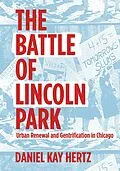"A brief, cogent analysis of gentrification in Chicago... An incisive and useful narrative on the puzzle of urban development" ( Kirkus).
In the years after World War II, a movement began to bring the middle class back to the Lincoln Park neighborhood on Chicago's North Side. In place of the old, poorly maintained apartments and dense streetscapes, "rehabbers" imagined a new kind of neighborhood-a modern community that combined the convenience, diversity, and character of a historic urban quarter with the prosperity and privileges of a new subdivision.
But as property values rose, longtime residents found themselves being evicted to make room for progress-and they began to assert their own ideas about the future of Lincoln Park. As divisions deepened over the course of the 1960s, debate gave way to increasingly violent demonstrations. Each camp became further entrenched as they tried to settle the eternal questions of city planning: Who is a neighborhood for? And who gets to decide?Autorentext
Daniel Kay Hertz has written about urban issues for a number of outlets, including City Observatory, The Atlantic, Chicago Magazine, South Side Weekly, and the Chicago Reader. He earned a BA in Government from Harvard University and an MA in Public Policy from the University of Chicago. He lives in Chicago.
Klappentext
In the years after World War II, a movement began to bring the middle class back from the Chicago suburbs to the Lincoln Park neighborhood on the city's North Side. In place of the old, poorly maintained apartments and dense streetscapes of taverns and butchers, "rehabbers" imagined a new kind of neighborhood-a renovated, modern community that held on to the convenience, diversity, and character of a historic urban quarter, but also enjoyed the prosperity and privileges of a new subdivision.
But as the old buildings came down, cheap studios were combined to create ever more spacious, luxurious homes. Property values rose swiftly, and the people who were evicted to make room for progress began to assert their own ideas about the future of Lincoln Park. Over the course of the 1960s, divisions within the community deepened. Letters and picket lines gave way to increasingly violent strikes and counterstrikes as each camp tried to settle the same existential questions that beguile so many cities today: Who is this neighborhood for? And who gets to decide?
